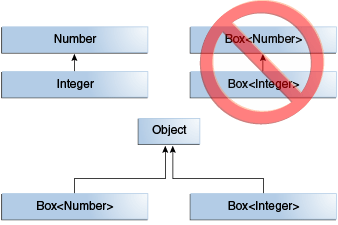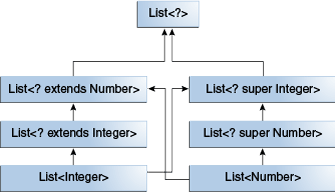https://docs.oracle.com/javase/tutorial/java/generics/inheritance.html
Generics, Inheritance, and Subtypes
What type of argument does it accept? By looking at its signature, you can see that it accepts a single argument whose type is Box<Number>. But what does that mean? Are you allowed to pass in Box<Integer> or Box<Double>, as you might expect? The answer is "no", because Box<Integer> and Box<Double> are not subtypes of Box<Number>.
This is a common misunderstanding when it comes to programming with generics, but it is an important concept to learn.
 Box<Integer> is not a subtype of Box<Number> even though Integer is a subtype of Number.
Box<Integer> is not a subtype of Box<Number> even though Integer is a subtype of Number.
Note: Given two concrete types
A and
B (for example,
Number and
Integer),
MyClass<A> has no relationship to
MyClass<B>, regardless of whether or not
A and
B are related. The common parent of
MyClass<A> and
MyClass<B> is
Object.
For information on how to create a subtype-like relationship between two generic classes when the type parameters are related, see
Wildcards and Subtyping.
https://docs.oracle.com/javase/tutorial/java/generics/genTypeInference.html
The Java compiler takes advantage of target typing to infer the type parameters of a generic method invocation. The target type of an expression is the data type that the Java compiler expects depending on where the expression appears. Consider the method Collections.emptyList, which is declared as follows:
static <T> List<T> emptyList();
Consider the following assignment statement:
List<String> listOne = Collections.emptyList();
This statement is expecting an instance of List<String>; this data type is the target type. Because the method emptyList returns a value of type List<T>, the compiler infers that the type argument T must be the value String. This works in both Java SE 7 and 8. Alternatively, you could use a type witness and specify the value of T as follows:
List<String> listOne = Collections.<String>emptyList();
However, this is not necessary in this context. It was necessary in other contexts, though. Consider the following method:
void processStringList(List<String> stringList) {
// process stringList
}
Suppose you want to invoke the method processStringList with an empty list. In Java SE 7, the following statement does not compile:
processStringList(Collections.emptyList());
The Java SE 7 compiler generates an error message similar to the following:
List<Object> cannot be converted to List<String>
The compiler requires a value for the type argument T so it starts with the value Object. Consequently, the invocation of Collections.emptyList returns a value of type List<Object>, which is incompatible with the method processStringList. Thus, in Java SE 7, you must specify the value of the value of the type argument as follows:
processStringList(Collections.<String>emptyList());
This is no longer necessary in Java SE 8. The notion of what is a target type has been expanded to include method arguments, such as the argument to the method processStringList. In this case, processStringList requires an argument of type List<String>. The method Collections.emptyList returns a value of List<T>, so using the target type of List<String>, the compiler infers that the type argument T has a value of String. Thus, in Java SE 8, the following statement compiles:
processStringList(Collections.emptyList());
See Target Typing in Lambda Expressions for more information.
https://docs.oracle.com/javase/tutorial/java/generics/subtyping.html
Wildcards and Subtyping
Given that Integer is a subtype of Number, what is the relationship between List<Integer> and List<Number>?
 The common parent is List<?>.
The common parent is List<?>.Although Integer is a subtype of Number, List<Integer> is not a subtype of List<Number> and, in fact, these two types are not related. The common parent of List<Number> and List<Integer> is List<?>.
In order to create a relationship between these classes so that the code can access Number's methods through List<Integer>'s elements, use an upper bounded wildcard:
List<? extends Integer> intList = new ArrayList<>();
List<? extends Number> numList = intList; // OK. List<? extends Integer> is a subtype of List<? extends Number>
Because Integer is a subtype of Number, and numList is a list of Number objects, a relationship now exists between intList (a list of Integer objects) and numList. The following diagram shows the relationships between several List classes declared with both upper and lower bounded wildcards.
 A hierarchy of several generic List class declarations.
A hierarchy of several generic List class declarations.The Guidelines for Wildcard Use section has more information about the ramifications of using upper and lower bounded wildcards.
Type Erasure
Type erasure ensures that no new classes are created for parameterized types; consequently, generics incur no runtime overhead.
Erasure of Generic Types
During the type erasure process, the Java compiler erases all type parameters and replaces each with its first bound if the type parameter is bounded, or Object if the type parameter is unbounded.
In the following example, the generic Node class uses a bounded type parameter:
public class Node<T extends Comparable<T>> {
private T data;
private Node<T> next;
public Node(T data, Node<T> next) {
this.data = data;
this.next = next;
}
public T getData() { return data; }
// ...
}
The Java compiler replaces the bounded type parameter T with the first bound class, Comparable:
public class Node {
private Comparable data;
private Node next;
public Node(Comparable data, Node next) {
this.data = data;
this.next = next;
}
public Comparable getData() { return data; }
// ...
}
Non-Reifiable Types
A reifiable type is a type whose type information is fully available at runtime. This includes primitives, non-generic types, raw types, and invocations of unbound wildcards.
Non-reifiable types are types where information has been removed at compile-time by type erasure — invocations of generic types that are not defined as unbounded wildcards. A non-reifiable type does not have all of its information available at runtime. Examples of non-reifiable types are List<String> and List<Number>; the JVM cannot tell the difference between these types at runtime. As shown in Restrictions on Generics, there are certain situations where non-reifiable types cannot be used: in an instanceof expression, for example, or as an element in an array.
Heap pollution occurs when a variable of a parameterized type refers to an object that is not of that parameterized type. This situation occurs if the program performed some operation that gives rise to an unchecked warning at compile-time.







